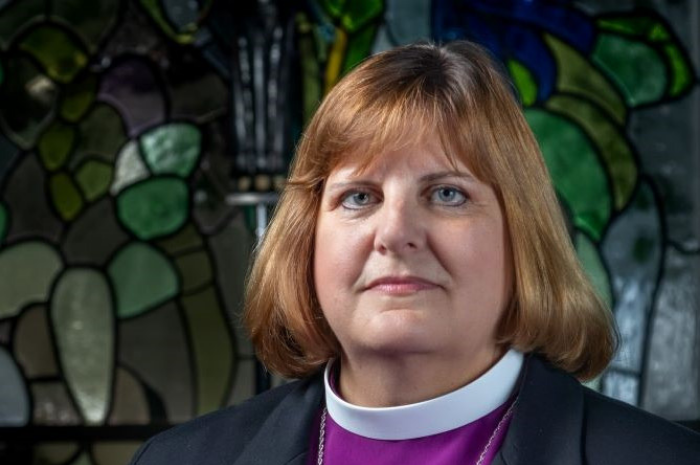Bishop’s Statement on Gun Violence

Since last weekend, three episodes of gun violence in our country have ended the lives of beloved children of God. I grieve with those who suffer and feel deep frustration at the ever-increasing toll of death and injury by gun violence. In the case of the shooting in El Paso, I condemn in the strongest possible terms the ethnic hatred (against our Hispanic sisters and brothers, in this case) that appears to have motivated the shooter, like many mass murderers before him.
As your bishop, I am deeply concerned about how our church can work to prevent such violence. In our baptism, we renounce the evil powers of this world which corrupt and destroy the creatures of God (Book of Common Prayer, p. 302). Among these evil powers are the sins of violence and racism. The church, then, has a special responsibility to oppose these evil, destructive forces and work to bring about a healthier, more civil society.
In the face of frustration and grief, my question for church leaders is: how can we work in our churches, in effective, practical, long-term ways that will oppose the evils that infect our country and help build a more just and peaceful world? I have several practical responses to suggest. Specific resources in each area are listed at the end of this letter.
1) Teaching and Modeling Respectful, Productive Discourse. American political discourse is so polarized that we have not been able to work together to achieve solutions to real and pressing problems like gun violence. The church can do better: we can learn how to engage in constructive discussions on issues we disagree about, and model this productive behavior for our society.
2) Opposing the Evil of Racism. Christians must deplore without reservation any act of racism, sexism, xenophobia, homophobia, or any other ideology that oppresses and destroys the creatures of God. Many acts of gun violence arise from these evil ideologies. Like many other Christian leaders, I implore our political leaders to avoid statements that feed the virulent strains of hatred that infect our society. We have the responsibility in our churches to oppose these evils and to teach and model understanding and compassion.
3) Teaching our Youth. One of the most important responsibilities of any church is to teach our young people about productive ways of living in a just and free society, from principles of nonviolent conflict resolution to learning about and opposing racism, sexism, and xenophobia. I urge our congregational leaders to consider carefully to teach young people to engage in healthy, loving behavior, and how to search proactively for supportive resources to engage with children and families who are troubled.
4) Promoting Safety in Churches. Our diocesan safety officer, Jeff Green has offered workshops on safety in churches, and would be happy to consult with any congregation on this issue.
5) Advocacy. From 1963 to 2017, statistics show that 186,239 children and teens died from gun violence in America – 3.5 times more than the number of American soldiers who died in hostilities in foreign wars during the same period.[1] Surely this death toll is unacceptable. One of my first acts as bishop has been to join Bishops United Against Gun Violence. Lay and clergy people can join the Gun Violence Prevention action group of the Episcopal Peace Fellowship. All of us can contact our state and federal representatives to urge concrete action on gun violence.
6) Prayer. Prayer for our world is one of the most important ministries of any Christian. Prayer is effective, not only in changing the conditions of the world around us, but also in changing our own hearts and preparing us to act. Pray for an end to violence and racism.
My sisters and brothers, I believe it is time for our society to take action, together, to end an epidemic of gun violence that all Christians deplore, whatever our political outlook. I hope you will join me in prayer and action to preserve the lives of the precious, beloved children of God.
Suggested Resources
1. On Teaching Civil Discourse:
- Office of Government Relations Civil Discourse Curriculum
- The Center for Nonviolent Communication
- The National Institute for Civil Discourse
- The Lombard Mennonite Peace Center
- Living Room Conversations
Our diocese has provided workshops on the Lombard Center and Living Room Conversations models in particular; some congregations are already benefiting from these techniques. We are now in conversation about how to expand these offerings to more congregations in future workshops.
2. Opposing the Sin of Racism:
- Sacred Ground: a film-based dialogue series on race and faith, offered by the Episcopal Church
- The Absalom Jones Episcopal Center for Racial Healing
- Courageous Conversations on Race
In the Diocese of San Diego, we are working on bringing Sacred Ground and other resources to our diocese for future Leadership Academy offerings.
3. Resources for Talking with Youth:
- How to Talk to Young People About the El Paso and Dayton Shootings(in English and Espanol)
- A Collection of Resources for Talking to Young People About Tragic Events
- Empowering Young People in the Aftermath of Hate (in English and Espanol)
- 5 Tips for Talking with Children about Hate Incidents
- Helping Students Make Sense of News Stories about Bias and Injustice
- Family Conversations about Gun Violence and Mass Shootings
4. Resources on Keeping Your Church Safe:
- 10 Easy Ways to Create a Safer Church this Sunday
- 8 Tips to Tighten Church Security
- 5 Things You Can Do to Keep Your Church Safe
- How to Make Your Church Safe Again
- How Do We Keep our Churches Safe in a World Where Evil is Present
- How Your Church Should Prepare for an Active Shooter
- Ways to Safeguard Your Church Against Active Shooters
5. Prayer Resources: